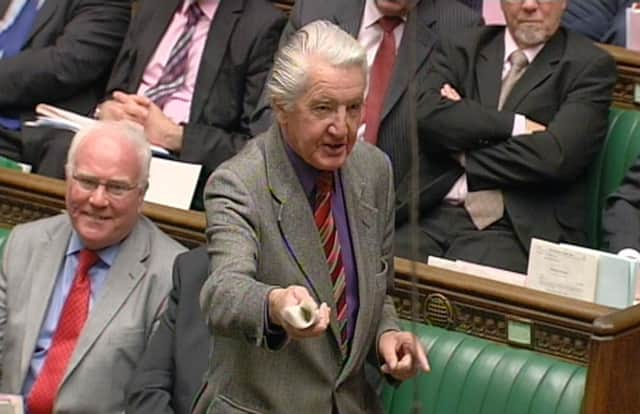Ian Blackford's attack on 'liar' Boris Johnson channelled Dennis Skinner at his best – Steve Cardownie


Having accused the Prime Minister of misleading Parliament over parties at No 10 during lockdown, he was told by the Speaker that this was unacceptable and despite several attempts to get him to withdraw the statement and before the Speaker could finally clarify the matter, he displayed a turn of speed that would make Usain Bolt blush and exited stage left, leaving the confused Speaker to mutter “ah well it doesn’t matter now”.
On entering Parliament, MPs are issued with a booklet titled “Rules of behaviour and courtesies in the House of Commons” and paragraph 25 states “you should always bear in mind Erskine May’s advice in Parliamentary Practice that ‘good temper and moderation are the characteristics of parliamentary language’”.
Advertisement
Hide AdAdvertisement
Hide AdAnd paragraph 26 states, “there is no hard and fast list of unparliamentary words. Whether something said is a breach of order depends on the context. The Speaker deprecates personal remarks about other Members. Any abusive or insulting language used in debate will be required to be withdrawn immediately”. And when referring to accusations of “deliberate falsehoods” it states that, apart from when commenting on a substantive motion, “No such accusations should be made in the course of other proceedings: if they are, they must be withdrawn immediately”.
Now Ian Blackford knew full well that calling the PM a liar (however justified) would incur the wrath of the Speaker and that if he did not withdraw the remark he would be expelled from the Chamber but he was not going to be denied his planned act of political theatre and actually promoted it to good effect before hotfooting it “oot the door”.
There is no doubt that the past master in the use of unparliamentary language was the former Labour MP, Dennis Skinner.
Among his colourful phrases for which he was suspended was one back in 1992 when he referred to Minister for Agriculture, John Gummer MP, as a “little squirt of a minister” and probably his most well-known transgression, back in 2016, was when he referred to the then Prime Minister, David Cameron as “Dodgy Dave” and refused to withdraw the remark.
Advertisement
Hide AdAdvertisement
Hide AdSuspended several times, Skinner recalled that on one occasion in 1992, he called Dr David Owen a pompous sod. “Mr Speaker said to me ‘You had better withdraw that’. I said that I would withdraw ‘pompous’ but said Mr Speaker ‘That’s not the word I’m looking for’. There was laughter in the House and everyone thought that I had hit the nail on the head. I thought that that was a real parliamentary triumph, but Mr Speaker thought differently. He said ‘Off you go’ and I did not get a chance to reply.”
However, despite some histrionics in the Chamber last Monday, it is clear that Boris Johnson is not yet off the hook and the revelations yet to see the light of day may well kill off his chances of clinging on to power.
A message from the Editor:
Thank you for reading this article. We're more reliant on your support than ever as the shift in consumer habits brought about by coronavirus impacts our advertisers.
If you haven't already, please consider supporting our trusted, fact-checked journalism by taking out a digital subscription.
Comment Guidelines
National World encourages reader discussion on our stories. User feedback, insights and back-and-forth exchanges add a rich layer of context to reporting. Please review our Community Guidelines before commenting.